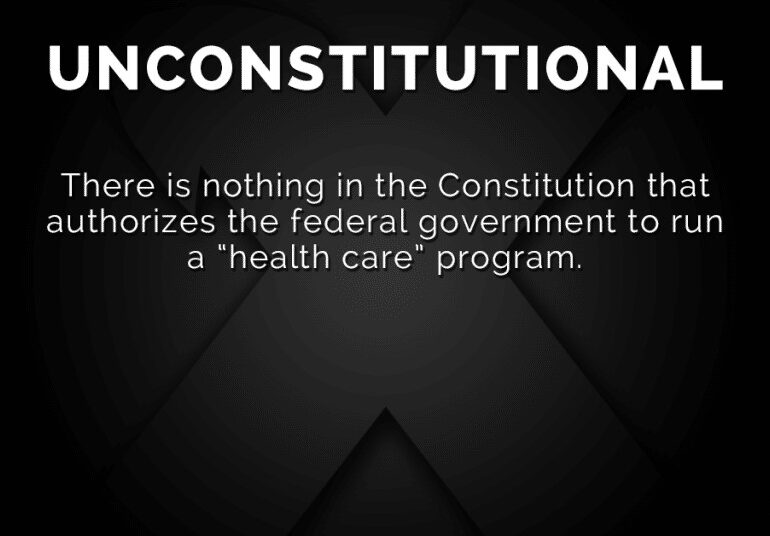
Johnsoncare, Bushcare, Obamacare, and Trumpcare
Former president Donald Trump has vowed to replace the Affordable Care Act (ACA, or Obamacare) with his own plan. Because “Obamacare is too expensive, and otherwise, not good healthcare,” he vowed:
I will come up with a much better, and less expensive, alternative! People will be happy, not sad!
I don’t want to terminate Obamacare, I want to REPLACE IT with MUCH BETTER HEALTHCARE.
Getting much better Healthcare than Obamacare for the American people will be a priority of the Trump Administration. It is not a matter of cost, it is a matter of HEALTH. America will have one of the best Healthcare Plans anywhere in the world. Right now it has one of the WORST!
Trump’s latest proposed plan is actually the second incarnation of Trumpcare and yet another in a long line of government health care plans.
In the beginning, there was Johnsoncare, otherwise known as Medicare. On July 30, 1965, President Lyndon Johnson signed into law the Social Security Amendments of 1965 that created Medicare. Medicare is a government health-insurance program for people age 65 or older, people under age 65 with certain disabilities, people with End-Stage Renal Disease (permanent kidney failure), or people with ALS (Lou Gehrig’s disease). It is the second-largest federal domestic program, after Social Security. In 2023, 65.6 million Americans were enrolled in Medicare, or roughly 25 percent of the adult population. Medicare consists of four parts: Part A (hospital insurance), Part B (medical insurance), Part C (Medicare Advantage plan), and Part D (prescription-drug plan).
Medicare Part D is otherwise known as Bushcare, the Medicare Prescription Drug, Improvement, and Modernization Act. This was instituted by a Republican-controlled Congress and signed into law by President George W. Bush in 2003. Part D provides subsidized access to prescription drug insurance coverage by joining a private plan approved by Medicare. As strange as it sounds, it was Democrats that almost defeated this massive expansion of the welfare state.
Then there was Obamacare. Signed into law on March 23, 2010, by President Barack Obama, it consisted of numerous “reforms” to health care and health insurance and a bevy of new taxes and tax increases to pay for them. Obamacare expanded Medicare; created state health-insurance exchanges; began federal subsidies for the purchase of health insurance; and required that insurance companies provide policies with minimum standards, cover all applicants without regard to their preexisting medical conditions, eliminate annual and lifetime caps on benefits, eliminate copayments and deductibles for selected health-insurance benefits, and allow children to remain on their parents’ insurance plan until their 26th birthday. It also imposed new taxes on indoor tanning services, drug companies, health insurers, medical-device manufactures, and comprehensive health-insurance plans. And then there were the Obamacare mandates that required employers to offer their employees health insurance and individuals to have health insurance.
And now we are faced once again with Trumpcare. Trump’s original new and improved version of Obamacare was called “An America-First Healthcare Plan.” As described by Trump: “My plan expands affordable insurance options, reduces the cost of prescription drugs, will end surprise medical billing, increases fairness through price transparency, streamlines bureaucracy, accelerates innovation, strongly protects Medicare, and always protects patients with preexisting conditions.” Trump hasn’t yet provided the world with the details of his second incarnation of Trumpcare. “I’m seriously looking at alternatives,” he has said.
One thing is certain: Because Trump and the vast majority of Republicans have no philosophical objection to government involvement in the health care and health insurance industries, Trumpcare II will not return the United States to a free market in health care or health insurance. It will not end Medicare, Medicaid, or CHIP. It will not abolish the Department of Health and Human Services (HHS), the Food and Drug Administration (FDA), the National Institutes of Health (NIH), the National Institute of Allergy and Infectious Diseases (NIAID), the Division of Healthcare Quality Promotion (DHQP), or the Centers for Disease Control and Prevention (CDC).
What Trump and most Republicans don’t recognize is that the Constitution nowhere authorizes the federal government to have anything to do with health care, health insurance, medical devices, medical treatment, medical records, medical research, clinical trials, family planning, HIV/AIDS prevention initiatives, vaccination programs, diet and exercise programs, hospitals, physicians, nurses, medical schools, or drugs. Health care is a service that can and should be provided on the free market just like any other service. No American should be forced to pay for the health care of any other American.
We don’t need Medicare, Bushcare, Obamacare, or Trumpcare. We need a free market in health care and health insurance. Health care must be separated from the state.
This article was originally published at the Future of Freedom Foundation